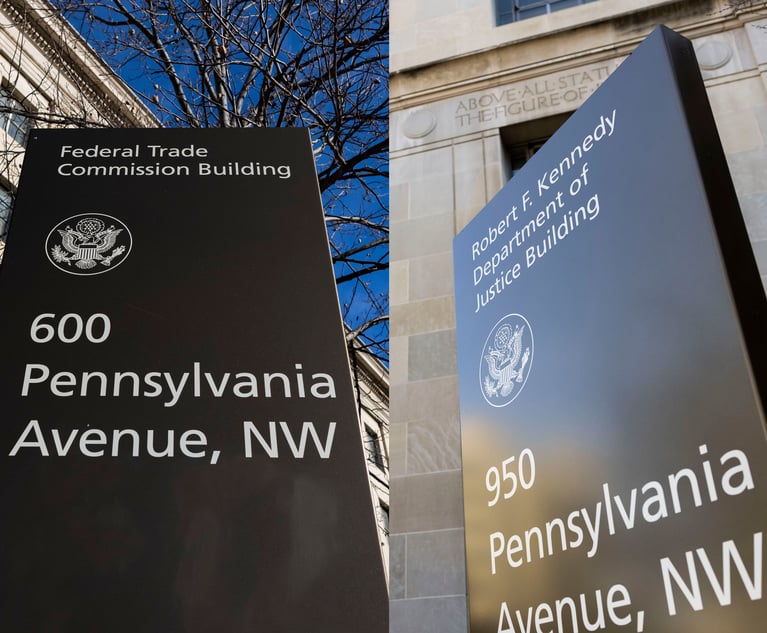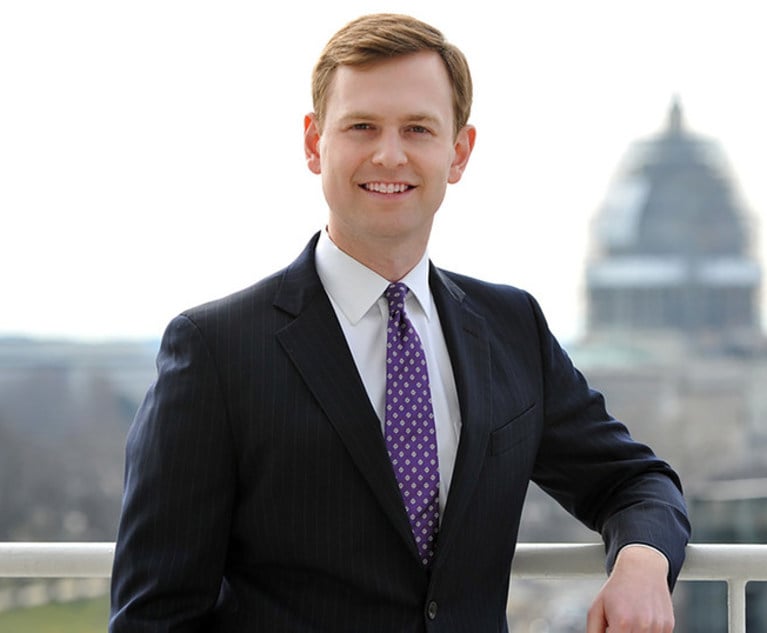 Photo: Diego M. Radzinschi/ALM
Photo: Diego M. Radzinschi/ALMUS Justice Department Recovered $2.8 Billion From False Claims Act Cases in 2018
The health care industry—and drug and medical device makers in particular—paid the most to settle fraud allegations, the bulk of which came to the government's attention as the result of whistleblower complaints.
December 28, 2018 at 02:24 PM
4 minute read
The U.S. Department of Justice went after fraud in the health care industry in a big way during Fiscal Year 2018.
Of the $2.8 billion in settlements and judgments that the government obtained during the year through False Claims Act cases, more than $2.5 billion involved health care fraud—an increase of more than $329 million over health care fraud recoveries for the prior fiscal year, according to DOJ statistics.
Overall, however, FCA recoveries dropped by more than $584 million compared with last year, when the DOJ's recoveries totaled $3.4 billion. The reason for the decline wasn't entirely clear and a DOJ spokesperson was not available for comment due to the federal government shutdown. But in January 2018, two memoranda, one issued by then-U.S. Associate Attorney General Rachel Brand and the other by civil fraud chief Michael Granston, suggested some changes in the DOJ's view of the False Claims Act that were perceived as more industry-friendly.
The largest recoveries in Fiscal Year 2018 came from the drug and medical device industry. One player in that sector, AmerisourceBergen Corp. and its subsidiaries, paid $625 million to settle charges filed under the whistleblower provisions of the FCA, alleging that it illegally distributed misbranded drugs for cancer patients.
Whistleblower complaints spurred the bulk of the DOJ's cases over the past year and accounted for $2.1 billion of the agency's recoveries.
“Whistleblowers have played a vital role in unmasking fraudulent schemes that might otherwise evade detection,” Joseph “Jody” Hunt, assistant attorney general of the Civil Division, the DOJ's largest litigating division, said in a prepared statement.
In another health care fraud case that ended with a substantial recovery, California-based independent physician association HealthCare Partners Holdings, doing business as DaVita Medical Holdings, forked over $270 million to the government to resolve its liability in an alleged Medicare scheme.
Other health care companies that settled FCA cases with the DOJ include Pfizer and United Therapeutics Corp., which paid $23.85 million and $210 million, respectively, after being accused of using illegal kickbacks to promote drugs that they manufactured.
The DOJ stated in a Dec. 21 announcement that its enforcement actions over the past year show that it continues to “place great importance on enforcing the safeguards contained within the Anti-Kickback Statute” under the FCA.
While health care-related recoveries increased in 2018, statistics show that the DOJ pursued roughly the same number of new FCA cases during 2017 and 2018. But the DOJ saw greater recoveries last year in fraud cases in which the Department of Health and Human Services and the Department of Defense were not the primary client agencies.
In other fraud recoveries, Deloitte & Touche paid $149.5 million after the government accused it of falling short on its responsibilities as an independent auditor for a mortgage lender client. The DOJ alleged that Deloitte failed to detect the mortgage lender's alleged scheme involving the sale of fictitious or double-pledged mortgage loans.
And, finally, at least one celebrity contributed to the DOJ's fraud-related recoveries last year. Lance Armstrong, the notorious former professional road racing cyclist, paid $5 million to settle a lawsuit alleging that he illegally profited from sponsorship payments from the U.S. Postal Service while lying about not using performance enhancing drugs.
Read more:
This content has been archived. It is available through our partners, LexisNexis® and Bloomberg Law.
To view this content, please continue to their sites.
Not a Lexis Subscriber?
Subscribe Now
Not a Bloomberg Law Subscriber?
Subscribe Now
NOT FOR REPRINT
© 2024 ALM Global, LLC, All Rights Reserved. Request academic re-use from www.copyright.com. All other uses, submit a request to [email protected]. For more information visit Asset & Logo Licensing.
You Might Like
View All
'Serious Disruptions'?: Federal Courts Brace for Government Shutdown Threat
3 minute read
Will Khan Resign? FTC Chair Isn't Saying Whether She'll Stick Around After Giving Up Gavel

FTC, DOJ Withdrawal of Antitrust Guidelines for Collaboration Infuriates Republicans
5 minute read
Trending Stories
Who Got The Work
Michael G. Bongiorno, Andrew Scott Dulberg and Elizabeth E. Driscoll from Wilmer Cutler Pickering Hale and Dorr have stepped in to represent Symbotic Inc., an A.I.-enabled technology platform that focuses on increasing supply chain efficiency, and other defendants in a pending shareholder derivative lawsuit. The case, filed Oct. 2 in Massachusetts District Court by the Brown Law Firm on behalf of Stephen Austen, accuses certain officers and directors of misleading investors in regard to Symbotic's potential for margin growth by failing to disclose that the company was not equipped to timely deploy its systems or manage expenses through project delays. The case, assigned to U.S. District Judge Nathaniel M. Gorton, is 1:24-cv-12522, Austen v. Cohen et al.
Who Got The Work
Edmund Polubinski and Marie Killmond of Davis Polk & Wardwell have entered appearances for data platform software development company MongoDB and other defendants in a pending shareholder derivative lawsuit. The action, filed Oct. 7 in New York Southern District Court by the Brown Law Firm, accuses the company's directors and/or officers of falsely expressing confidence in the company’s restructuring of its sales incentive plan and downplaying the severity of decreases in its upfront commitments. The case is 1:24-cv-07594, Roy v. Ittycheria et al.
Who Got The Work
Amy O. Bruchs and Kurt F. Ellison of Michael Best & Friedrich have entered appearances for Epic Systems Corp. in a pending employment discrimination lawsuit. The suit was filed Sept. 7 in Wisconsin Western District Court by Levine Eisberner LLC and Siri & Glimstad on behalf of a project manager who claims that he was wrongfully terminated after applying for a religious exemption to the defendant's COVID-19 vaccine mandate. The case, assigned to U.S. Magistrate Judge Anita Marie Boor, is 3:24-cv-00630, Secker, Nathan v. Epic Systems Corporation.
Who Got The Work
David X. Sullivan, Thomas J. Finn and Gregory A. Hall from McCarter & English have entered appearances for Sunrun Installation Services in a pending civil rights lawsuit. The complaint was filed Sept. 4 in Connecticut District Court by attorney Robert M. Berke on behalf of former employee George Edward Steins, who was arrested and charged with employing an unregistered home improvement salesperson. The complaint alleges that had Sunrun informed the Connecticut Department of Consumer Protection that the plaintiff's employment had ended in 2017 and that he no longer held Sunrun's home improvement contractor license, he would not have been hit with charges, which were dismissed in May 2024. The case, assigned to U.S. District Judge Jeffrey A. Meyer, is 3:24-cv-01423, Steins v. Sunrun, Inc. et al.
Who Got The Work
Greenberg Traurig shareholder Joshua L. Raskin has entered an appearance for boohoo.com UK Ltd. in a pending patent infringement lawsuit. The suit, filed Sept. 3 in Texas Eastern District Court by Rozier Hardt McDonough on behalf of Alto Dynamics, asserts five patents related to an online shopping platform. The case, assigned to U.S. District Judge Rodney Gilstrap, is 2:24-cv-00719, Alto Dynamics, LLC v. boohoo.com UK Limited.
Featured Firms
Law Offices of Gary Martin Hays & Associates, P.C.
(470) 294-1674
Law Offices of Mark E. Salomone
(857) 444-6468
Smith & Hassler
(713) 739-1250






